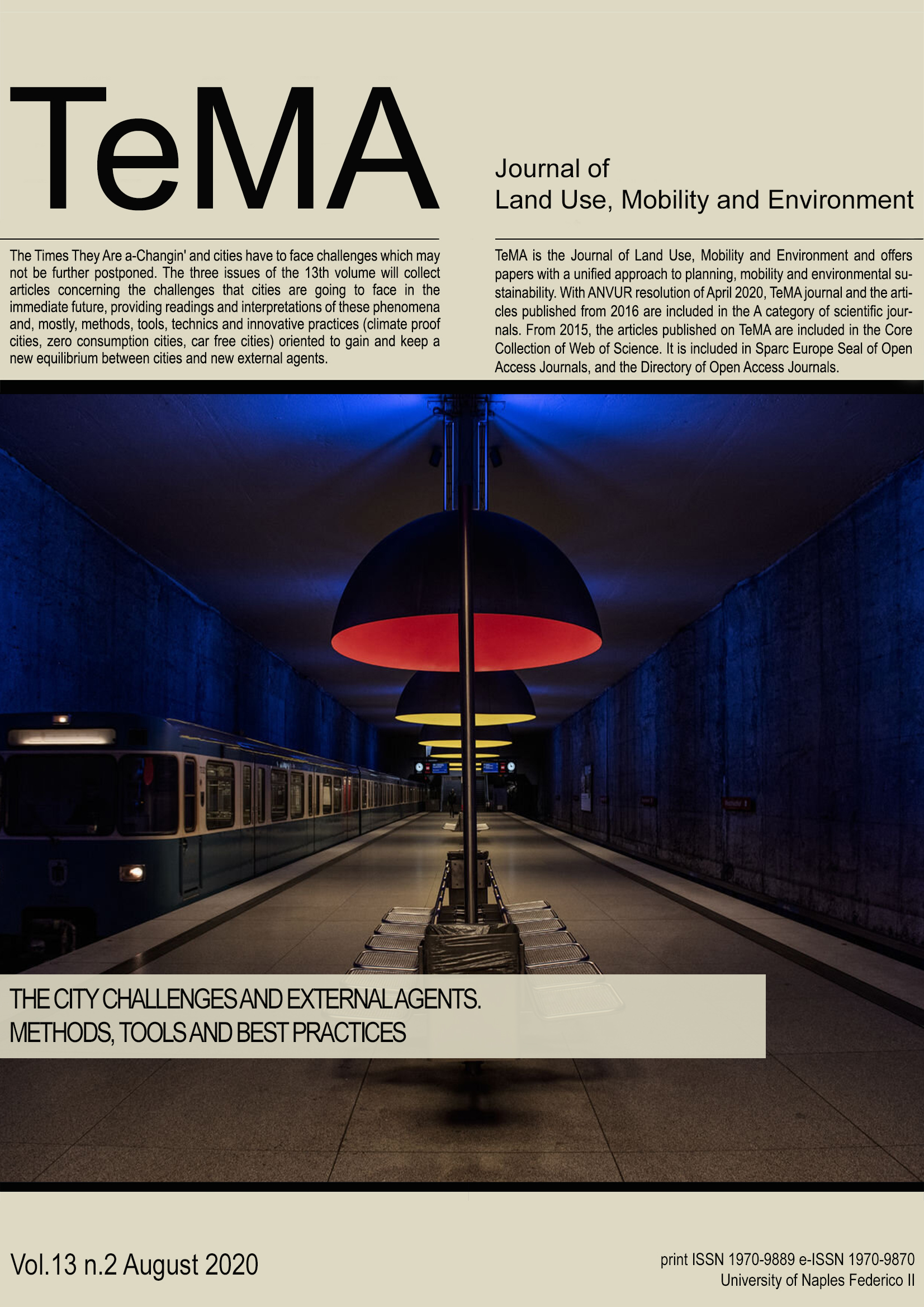Building strategic scenarios during Covid-19 lockdown
Insights from a university-class remote simulation
Abstract
Since early spring 2020, the outbreak of the COVID-19 in Italy caused schools and universities to lock and shift from traditional face-to-face classroom education to online education. In the academic field of spatial planning, online education and examples of on-line participatory process (e.g. e-planning, e-governance, etc.) are traditionally not very frequent. Through the application of an on-line participatory process to build a future vision of Bari (Apulia Region), this study explores elements related to the behavior of the knowledge agents involved in the process and compares them with the application of previous face-to-face classroom examples. The results obtained allow to collect some suggestions not only on the performance of the application in two different times, but also on the potential elements of difference to be associated to the temporal and psychological context related to the diffusion of COVID-19. Since these conditions are clearly exceptional and practically (hopefully) unrepeatable, the results seem to show a mixed perspective of effectiveness for the use of online education to build a future vision of a city.
Downloads
References
Appanna, S. (2008). A review of benefits and limitations of online learning in the context of the student, the instructor and the tenured faculty. International Journal on E-Learning, 7(1), 5-22.
Bao, W. (2020). COVID ‐19 and online teaching in higher education: A case study of Peking University. Human Behavior and Emerging Technologies, 2(2), 113–115. https://doi.org/10.1002/hbe2.191
Basilaia, G. & Kvavadze, D. (2020). Transition to Online Education in Schools during a SARS-CoV-2 Coronavirus (COVID-19) Pandemic in Georgia. Pedagogical Research, 5(4), 1–9. https://doi.org/10.29333/pr/7937
Borri, D., Camarda, D., & Pluchinotta, I. (2013). Planning Urban Microclimate through Multiagent Modelling: A Cognitive Mapping Approach. Lecture Notes in Computer Science, 169–176. https://doi.org/10.1007/978-3-642-40840-3_25
Borri, D., Camarda, D., Grassini, L., & Patano, M. (2014). Learning and Sharing Technology in Informal Contexts. A Multiagent-Based Ontological Approach. TeMA. Journal of Land Use, Mobility and Environment. https://doi.org/10.6092/1970-9870/2542
Celino, A. & Concilio, G. (2010). Participation in environmental spatial planning: Structuring-scenario to manage knowledge in action. Futures 42 (7), 733-742.
Friend, J., & Jessop., N. W. (1969). Local Government and Strategic Choice (Routledge Revivals) (1st ed.). London, Routledge.
Honey-Rosés J., Anguelovski I., Bohigas J., Chireh V., Daher C., Konijnendijk van den Bosch C., Litt J., Mawani V., McCall M., Orellana A., Oscilowicz E., Sánchez-Sepúlveda HU., Senbel M., Tan X., Villagomez E., Zapata O. Nieuwenhuijsen M. (2020). The Impact of COVID-19 on Public Space: A Review of the Emerging Questions. https://doi.org/10.31219/osf.io/rf7xa.
Jungk R. & Mullert, N. (1996). Future Workshop: How to Create Desirable Futures. London: Institute for Social Inventions
Khakee, A., Barbanente, A., & Borri, D. (2000). Expert and experiential knowledge in planning. Journal of the Operational Research Society, 51(7), 776–788. https://doi.org/10.1057/palgrave.jors.2600841
Khakee, A., Barbanente, A., Camarda, D., & Puglisi, M. (2002). With or without? Comparative study of preparing participatory scenarios using computer-aided and traditional brainstorming. Journal of Future Research, 6, pp. 45-64.
Lee VJ, Ho M., Kai CW, Aguilera X., Heymann D. & Wilder-Smith A. (2020). Epidemic preparedness in urban settings: new challenges and opportunities. The Lancet Infectious Diseases, 20(5), 527 – 529
Mastrodonato, G. & Camarda, D. (2020). Imagining living spaces in extreme conditions: Suggestions from a case study in Bari. TeMA. Journal of Land Use, Mobility and Environment, Special Issue (COVID-19 vs CITY 20: Scenarios, insights, reasoning and research) http://dx.doi.org/10.6092/1970-9870/6870
Ortegon-Sanchez A., Tyler N. (2016). Constructing a Vision for an ‘Ideal’ Future City: A Conceptual Model for Transformative Urban Planning, Transportation Research Procedia, Volume 13, Pages 6-17, ISSN 2352-1465, https://doi.org/10.1016/j.trpro.2016.05.002
Rabino, G. & Stufano Melone, M.R. (2020). Joys and sorrows of living in an uncertain world, in C. De Lucia, D. Borri, A. Kubursi & A. Khakee (eds.), Economics and Engineering of Unpredictable Events. Modelling, Planning, Policies, London, Taylor and Francis, (forthcoming).
Ringland, G. (1998). Scenario Planning: Managing for the Future. London, John Wiley & Son Ltd..
Sahu, P. (2020). Closure of Universities Due to Coronavirus Disease 2019 (COVID-19): Impact on Education and Mental Health of Students and Academic Staff. Cureus. 12. https://doi.org/10.7759/cureus.7541
Shipley, R. (2002). Visioning in Planning: Is the Practice Based on Sound Theory?. Environment and Planning A. 34. 7-22. https://doi.org/10.1068/a3461.
Subhashni A. (2008). A Review of Benefits and Limitations of Online Learning in the Context of the Student, the Instructor and the Tenured Faculty. International Journal on E-Learning. 7.
UNESCO (2020). https://en.unesco.org/covid19/educationresponse
Zweig, S. (1942). Die Welt von Gestern (The World of Yesterday), Stockholm, Bermann-Fischer.
Copyright (c) 2020 TeMA - Journal of Land Use, Mobility and Environment

This work is licensed under a Creative Commons Attribution 4.0 International License.
Authors who publish in this journal agree to the following:
1. Authors retain the rights to their work and give in to the journal the right of first publication of the work simultaneously licensed under a Creative Commons License - Attribution that allows others to share the work indicating the authorship and the initial publication in this journal.
2. Authors can adhere to other agreements of non-exclusive license for the distribution of the published version of the work (ex. To deposit it in an institutional repository or to publish it in a monography), provided to indicate that the document was first published in this journal.
3. Authors can distribute their work online (ex. In institutional repositories or in their website) prior to and during the submission process, as it can lead to productive exchanges and it can increase the quotations of the published work (See The Effect of Open Access)

